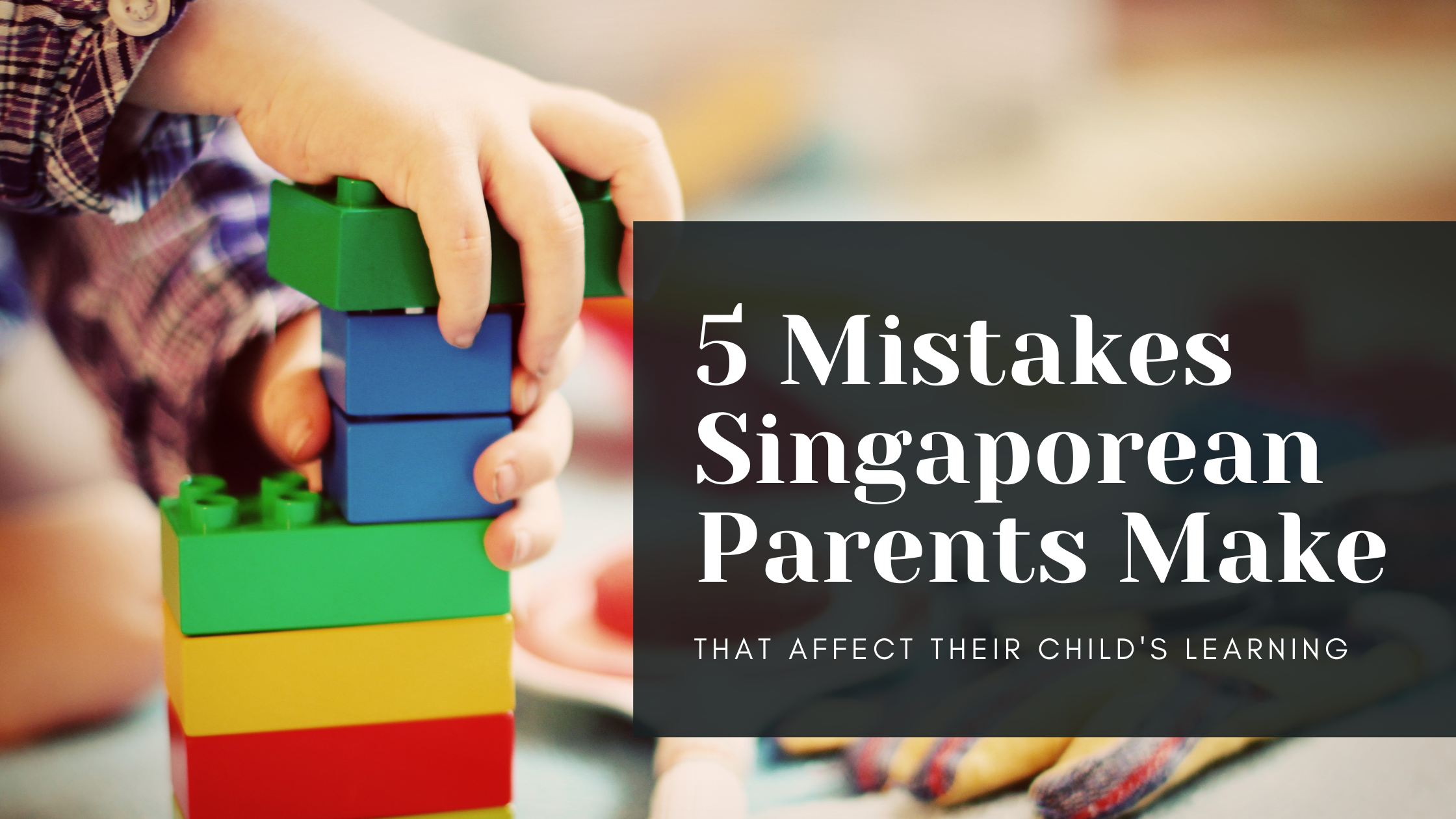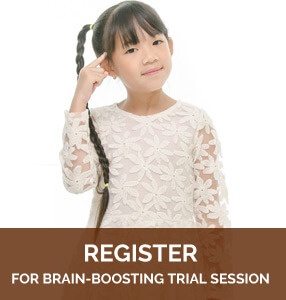5 Mistakes Singaporean Parents Make That Affects Their Child’s Learning

Being parents, we want the best for our kids. But usually most of the time, we don’t know what we’re doing wrong or what we’re doing right. Truth is, there is no wrong or right way to teach a child, we all have our own way of teaching.
But from our 16+ years of experience, we’ve noticed a few common mistakes that parents unknowingly commit that slows down their child’s learning potential.
These mistakes although seems normal on the surface, can slow down your child’s learning, growth and sometimes even confidence. But it can be easily identified and prevented.
So if you have a child aged 5-12, you might be making the same mistakes as the many parents we have spoken to or observed. And the pointers we’ll be sharing will be crucial to helping you make sure that your child is on the right path to using his brain effectively.
So let’s get started!
Mistake #1: Discouraging Your Child From Expressing Themselves
Many parents we’ve noticed are quick to tell their children to keep quiet and behave in public. Sometimes, they do it just because they are too busy to handle their child’s comments or maybe they’re just having a bad day.
The problem here is that if you stop your child from expressing himself, he might lose confidence in his thoughts and might feel that his presence is unwanted. This reflects in his learning as he will be more afraid to make mistakes and will be closed off when exposed to new concepts.
Here’s what you should do:
Ask him about what he learned in school that day. Not just surface questions, but get him to try and re-teach you what he learnt. This way, you will also get him to revise and reflect the lessons he learnt in school. Also, he’ll be more confident in sharing more about all the other things he experiences. He’ll always be on the lookout to learning new things so that he can explain them to you once he gets home.
Mistake #2: Letting Them Use A Digital Device At An Early Age
Many kids under the age of 3 are already exposed to using a tablet or some other form of digital device as a method of learning. Many experts have had differing views regarding the use of technology with kids at an early age. But we believe the golden rule here is moderation.
Psychologist Dr Aric Sigman says that children need to have regular face to face contact in order to pick up the social skills that are vital for them being successful during their lives. He believes that if many hours a day are being displaced by looking at screens passively these skills may not develop as fully. And it could also have an effect on how children interact with each other.
(http://www.itv.com/news/2013-11-28/tonight-too-young-for-technology/)
Here’s what you should do:
Control and moderate the amount of time spent on digital devices. The general recommendation is less than 60 minutes a day. And try to make sure that it is mainly used for educational purposes.
Mistake #3: Not Giving Him Time To Play Or Exercise
Bogging him down with too much tuition, after class activities (sometimes till late at night), even after all the homework he receives from school; damages and limits his ability to learn and accept all the new information that he receives.
Walking or cycling regularly for between six months to a year can improve memory and problem-solving skills in children by between 15 and 20 percent, according to researchers.
They have shown that such exercise can also increase the size of crucial parts of the brain. The scientists have also discovered that children who are fit also tend to be better at multitasking and performing difficult mental tasks than unfit friends.
Professor Art Kramer, director of the Beckman Institute for Advanced Science and Technology at the University of Illinois, who led the research, said their findings could have major implications for improving children’s performance at school.
(http://www.telegraph.co.uk/news/health/news/9090981/Regular-exercise-can-improve-memory-and-learning.html)
Here’s what you should do:
Set aside some time, at least, an hour, purely for outdoor activities. There are many sports that you can partake with your child. Badminton, football, basketball, just to name a few. This will also build his fitness and stamina other than just his cognitive abilities.
Also, brain games and activities that exercise his brain in a fun and healthy way can also give him the right training to develop a strong and effective mind.
Mistake #4: Not Training Your Child To Pay Attention
Is your child easily distracted when he is doing his homework?
You find that he has difficulty staying on one task for longer than 15 minutes and every day… you have to constantly remind him to pay attention in school and at home.
However, no matter how many times you have reminded him, he still commits silly careless mistakes in his homework at the end of the day.
Not only that… you find yourself having to constantly repeat what you have to say to him because his mind just seems to be somewhere else.
If you find yourself nodding to any of the statements above, chances are your child may have weak attentional abilities.
Popular to contrary belief, a child’s attention can be trained.
According to a study conducted by Meghan McClelland an associate professor at Oregon State University, preschool children who were rated high by their parents on attention and persistence had nearly a 50 percent greater chance of earning their bachelor’s degree by age 25.
(https://www.care.com/a/10-tips-for-getting-kids-to-pay-attention-1309201107)
One of the biggest objectives of proper cognitive development is ensuring that your child remains focused and attentive when completing homework or when he’s in class.
Here’s what you could do:
1) Provide Clear Directions
Break assignments into small steps, and ask your child to repeat the directions. This will help your child with organisational and sequencing skills and ensure your directions are understood.
2) Set a Timer
A kitchen timer will help your child learn time-management skills. Knowing there is a time limit will remind children to redirect their wandering attention back to the task at hand. A timer also tells the child the task has an end, relieving them of the hopeless feeling that it will go on forever.
3) Monitor Your Behaviour
Children take cues from the adults around them. If you find yourself only half-paying attention to your child while checking email on your phone, be aware you are modelling this behaviour in front of your child.
Would you like to get a check-in of your child’s attentional ability? Join us for a Hands-On Brain Boosting session to receive an Initial Brain Profile report and let your child experience brain-stimulating activities to boost their focus and carefulness to details.
Register here now!
Mistake #5: Too Much Stress
Before you continue reading this,
I want to stress that this is the worst of all the 5 bad mistakes we have shared.
Especially in Singapore, too many kids are already so stressed out with high expectations from their parents and experience high competition in the class itself.
So please pay careful attention to your child’s stress levels.
Like I mentioned before, many parents are now placing too much stress on their kids by sending them to excessive amounts of tuition. Some even send their kids to tuition just because they don’t want their kids to “lose out”.
**Don’t get us wrong, It’s not that tuition doesn’t work (many children have had massive help and success with tuition), What we are saying is that there is a fine balance between having enough and having too much. And excessive tuition is definitely harmful and affects your child’s academic ability.
This “tuition fixation” was also addressed by past Minister For Education, Mr. Heng Swee Kiat, and he even calls it “harmful”.
Here’s what you could do:
Send him for just enough tuition and only if you think he really needs it. It would also be good to communicate your expectations to him clearly. Also, cognitive development will help him learn better and in turn, reduces the stress he experiences when doing homework.
But we’re sure another big reason why parents send their kids to tons of tuition is because their child usually gets bad grades in school. They might even get stuck on a question and start to lose concentration and ends up doodling on his book and loses interest in continuing.
The truth is…
It is not because their child is not smart.
It’s not even because he is “slow” or “takes time” to learn.
Or even because he is ill-disciplined or has behavioural issues.
Their child may just have…
Poor Cognitive Abilities!
“What’s that?”
Cognitive abilities are the core foundation for all our learning functions. Without strong cognitive abilities, it will be almost impossible for us to understand something new.
And this is the root cause that most parents don’t understand.
Many may believe that feeding more content or even teaching their kids “mind mapping” will help them learn better or achieve better results. No doubt, these are useful study techniques and tactics but it only works well if the child is first able to understand, focus, remember and apply what they are learning.
The truth is, without a strong foundation, your child will not be able to easily grasp new concepts and apply newly taught information.
Thus, the critical missing key for successful and effective learning is to ensure our children have been given a strong cognitive foundation – to equip them with the skills to help themselves learn confidently and effectively!
To kickstart your child’s journey in building a strong cognitive foundation, join us for a Hands-On Brain Boosting session to ignite their brain abilities NOW! Register HERE.
















